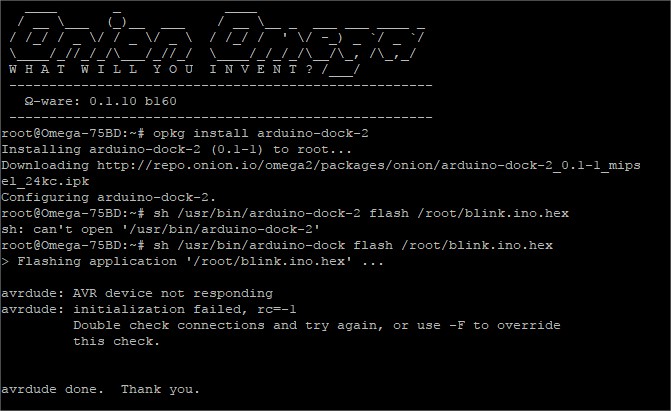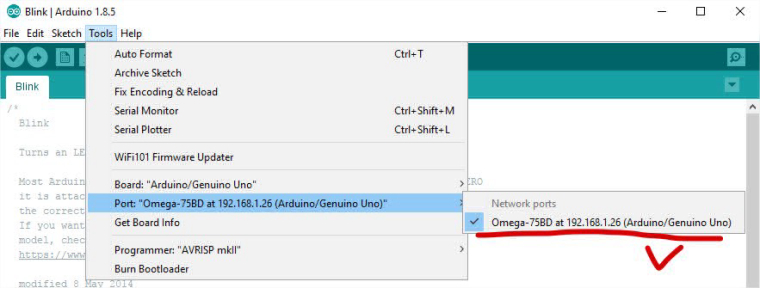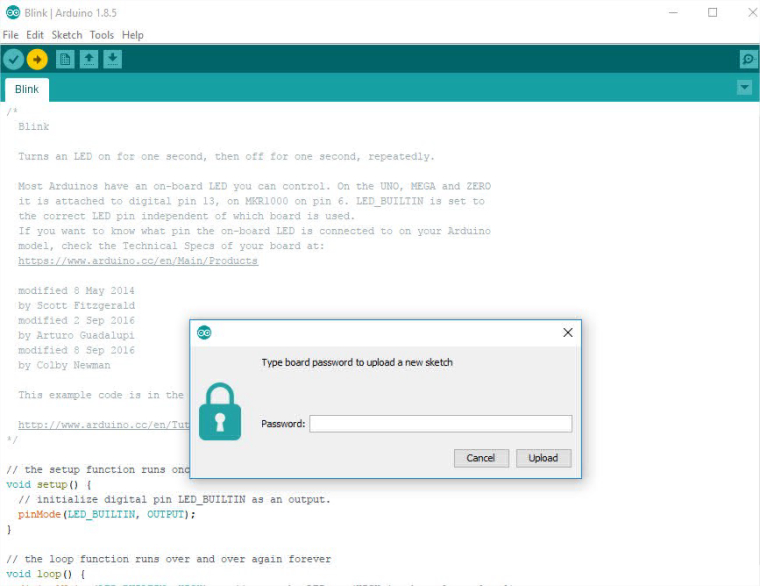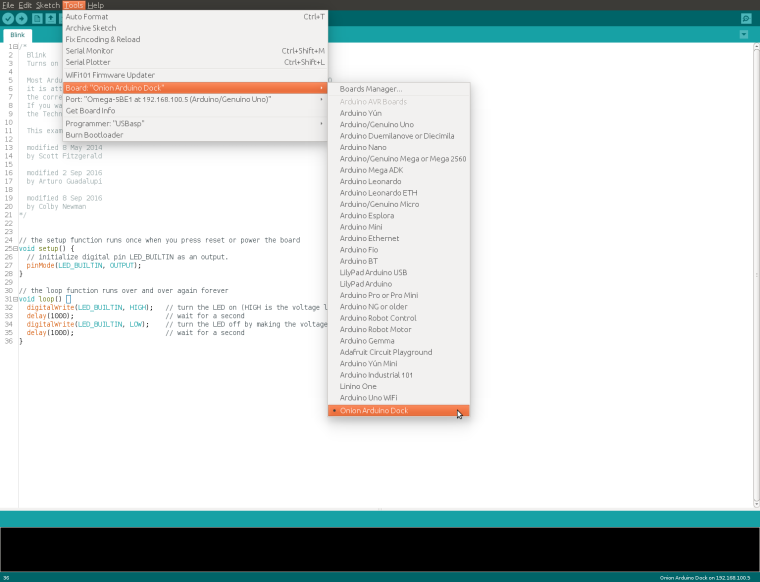Omega 2 and Arduino dock.
-
@Douglas-Kryder
Hi guys. Thank you so much for your support. I've returned the Arduino dock and the new one works straight from the box. As stated above, it is not the first blown component I've bought from those guys. Someone brings a defective item back and they just put it back on the shelf. NEVER buying from them again.
Anyway, thanks allot. I really appreciate your support.
-
I have a Onion2+ and used to have the OnionExpansion dock.
Now I switched to the Arduino Dock, set up the Arduino IDE and wanted to flash some basic sketch.
But I get the error:
Can't export GPIO 19, already exported/busy?: Resource busy avrdude done. Thank you.Could this be because I switched to the Arduino Dock?
I tried echoing 19 to the unexport file but there I got an ash permission error.
-
@Patrick-Fehr
Did you switch to Arduino Dock or Arduino Dock 2?
-
I switched to Arduino dock 2 (the one that hosts an extension pins mount) . I also made sure, I have (only) the right opkg package. I can check all the versions and outputs later if that helps.
-
@Patrick-Fehr said in Omega 2 and Arduino dock.:
I also made sure, I have (only) the right opkg package.
Please try to (re)install arduino-dock-2 (and avrdude of course) with deactivated LEDE package repos.
See also Known Firmware Issues
-
This actually solved my problem. Thank you very much!
root@o-megaman:~# cat /etc/opkg/distfeeds.conf #src/gz reboot_core http://downloads.lede-project.org/snapshots/targets/ramips/mt7688/packages #src/gz reboot_base http://downloads.lede-project.org/snapshots/packages/mipsel_24kc/base #src/gz reboot_onion http://downloads.lede-project.org/snapshots/packages/mipsel_24kc/onion ## src/gz reboot_luci http://downloads.lede-project.org/snapshots/packages/mipsel_24kc/luci ## src/gz reboot_packages http://downloads.lede-project.org/snapshots/packages/mipsel_24kc/packages ## src/gz reboot_routing http://downloads.lede-project.org/snapshots/packages/mipsel_24kc/routing ## src/gz reboot_telephony http://downloads.lede-project.org/snapshots/packages/mipsel_24kc/telephony src/gz omega2_core http://repo.onion.io/omega2/packages/core src/gz omega2_base http://repo.onion.io/omega2/packages/base src/gz omega2_packages http://repo.onion.io/omega2/packages/packages src/gz omega2_onion http://repo.onion.io/omega2/packages/onionroot@o-megaman:~# opkg list-installed |grep avr root@o-megaman:~# opkg list-installed |grep ardu root@o-megaman:~#root@o-megaman:~# opkg install arduino-dock-2 Installing arduino-dock-2 (0.1-1) to root... Downloading http://repo.onion.io/omega2/packages/onion/arduino-dock-2_0.1-1_mipsel_24kc.ipk Installing avrdude (6.1-1) to root... Downloading http://repo.onion.io/omega2/packages/onion/avrdude_6.1-1_mipsel_24kc.ipk Installing libncurses (6.0-1) to root... Downloading http://repo.onion.io/omega2/packages/base/libncurses_6.0-1_mipsel_24kc.ipk Installing libreadline (7.0-1) to root... Downloading http://repo.onion.io/omega2/packages/base/libreadline_7.0-1_mipsel_24kc.ipk Installing libusb-compat (0.1.4-2) to root... Downloading http://repo.onion.io/omega2/packages/base/libusb-compat_0.1.4-2_mipsel_24kc.ipk Installing libusb-1.0 (1.0.21-1) to root... Downloading http://repo.onion.io/omega2/packages/base/libusb-1.0_1.0.21-1_mipsel_24kc.ipk Installing libftdi1 (1.3-1) to root... Downloading http://repo.onion.io/omega2/packages/packages/libftdi1_1.3-1_mipsel_24kc.ipk Installing libelf1 (0.168-1) to root... Downloading http://repo.onion.io/omega2/packages/base/libelf1_0.168-1_mipsel_24kc.ipk Configuring libusb-1.0. Configuring libftdi1. Configuring libelf1. Configuring libncurses. Configuring libreadline. Configuring libusb-compat. Configuring avrdude. Configuring arduino-dock-2.Archiving built core (caching) in: /var/folders/sf/5t0cxvpj3bn0wv48vsrlk8440000gn/T/arduino_cache_494256/core/core_arduino_avr_uno_51f02b7210b938436b779d1c032618e1.a Sketch uses 444 bytes (1%) of program storage space. Maximum is 32256 bytes. Global variables use 9 bytes (0%) of dynamic memory, leaving 2039 bytes for local variables. Maximum is 2048 bytes. > Flashing application '/tmp/sketch.hex' ... avrdude: AVR device initialized and ready to accept instructions Reading | ################################################## | 100% 0.00s avrdude: Device signature = 0x1e950f avrdude: erasing chip avrdude: reading input file "0x3f" avrdude: writing lock (1 bytes): Writing | ################################################## | 100% 0.00s avrdude: 1 bytes of lock written avrdude: verifying lock memory against 0x3f: avrdude: load data lock data from input file 0x3f: avrdude: input file 0x3f contains 1 bytes avrdude: reading on-chip lock data: Reading | ################################################## | 100% 0.00s avrdude: verifying ... avrdude: 1 bytes of lock verified avrdude: reading input file "0x05" avrdude: writing efuse (1 bytes): Writing | ################################################## | 100% 0.00s avrdude: 1 bytes of efuse written avrdude: verifying efuse memory against 0x05: avrdude: load data efuse data from input file 0x05: avrdude: input file 0x05 contains 1 bytes avrdude: reading on-chip efuse data: Reading | ################################################## | 100% 0.00s avrdude: verifying ... avrdude: 1 bytes of efuse verified avrdude: reading input file "0xDA" avrdude: writing hfuse (1 bytes): Writing | ################################################## | 100% 0.00s avrdude: 1 bytes of hfuse written avrdude: verifying hfuse memory against 0xDA: avrdude: load data hfuse data from input file 0xDA: avrdude: input file 0xDA contains 1 bytes avrdude: reading on-chip hfuse data: Reading | ################################################## | 100% 0.00s avrdude: verifying ... avrdude: 1 bytes of hfuse verified avrdude: reading input file "0xFF" avrdude: writing lfuse (1 bytes): Writing | ################################################## | 100% 0.00s avrdude: 1 bytes of lfuse written avrdude: verifying lfuse memory against 0xFF: avrdude: load data lfuse data from input file 0xFF: avrdude: input file 0xFF contains 1 bytes avrdude: reading on-chip lfuse data: Reading | ################################################## | 100% 0.00s avrdude: verifying ... avrdude: 1 bytes of lfuse verified avrdude done. Thank you. avrdude: AVR device initialized and ready to accept instructions Reading | ################################################## | 100% 0.01s avrdude: Device signature = 0x1e950f avrdude: NOTE: "flash" memory has been specified, an erase cycle will be performed To disable this feature, specify the -D option. avrdude: erasing chip avrdude: reading input file "/tmp/sketch.hex" avrdude: input file /tmp/sketch.hex auto detected as Intel Hex avrdude: writing flash (32768 bytes): Writing | ################################################## | 100% 0.73s avrdude: 32768 bytes of flash written avrdude: verifying flash memory against /tmp/sketch.hex: avrdude: load data flash data from input file /tmp/sketch.hex: avrdude: input file /tmp/sketch.hex auto detected as Intel Hex avrdude: input file /tmp/sketch.hex contains 32768 bytes avrdude: reading on-chip flash data: Reading | ################################################## | 100% 0.58s avrdude: verifying ... avrdude: 32768 bytes of flash verified avrdude: reading input file "0x0f" avrdude: writing lock (1 bytes): Writing | ################################################## | 100% 0.01s avrdude: 1 bytes of lock written avrdude: verifying lock memory against 0x0f: avrdude: load data lock data from input file 0x0f: > Done, flash successful > Flash complete! avrdude: input file 0x0f contains 1 bytes avrdude: reading on-chip lock data: Reading | ################################################## | 100% 0.00s avrdude: verifying ... avrdude: 1 bytes of lock verified avrdude done. Thank you.
-
Hi...i am a new user here. As per my knowledge you should still be able to use your Omega in the Arduino dock and get WIFI access you just need to plug the Omega into the Arduino dock and power in to the micro USB connector.
-
[O2+ with Arduino Dock 2]
After leaving the Onion take dust for over 8 months because of this problem i gave it a try today ..
No success ... i was reading this thread again from the whole beginning and tried litteraly everything.i confirm that :
- all this was done on a fresh new installation of last Onion firmware
- i added the lines in boards.txt (as you can see further my arduino IDE recognises the board)
i use arduino 1.8.5 but anyway even via ssh with the ino in /root/ folder i have the same damn error - i have AvrDude 6.1 installed (not the newest from LEDE package)
Still the same error i had 9 month ago, directly in SSH or on Arduino IDE

i don't have the buggy AVR-dude from later versions (LEDE Package Repos are commented out) / i have v 6.1



ANYWAY => same error, in IDE like in SSH

HELP ! i tried everything, spend hours having an headache because of this ...
The only thing i didn't do is to try to flash again the bootloader
(because i just have the Arduino dock and it would be a pain in the ass to put these wires on ICSP ...
anyway it might not solve the problem
this procedure : https://wiki.onion.io/Tutorials/Arduino-Dock/Initial-Setup#arduino-dock-setup_using-the-omega-expansion-dock-with-the-arduino-dock-icsp-headerdo anyone did this ? flash the ArduinoDock2 from Onion2 while the onion is currently on that dock ?
I beg for help im desperate. I backed Onion to be able to use it with Arduino and it does not work.
is it possible that the dock or arduino itself is defectuous ?
-
@frederic-raducki
So you have an Omega2(+) with FW 0.1.10 b160 and an Arduino Dock 2.
Please execute a Factory Reset and setup Onion's Wifi network correctly again.
Next steps:
opkg update
opkg install arduino-dock-2Omega and your PC are connected to the same Wifi network and can reach the Internet.
The Arduino IDE has already installed on your PC and set up almost correctly.
Please read again the Onion Omega2 Documentation's Flashing the Arduino Dock part more carefully.
Please check especially this part Installing the Arduino Dock Device ProfileClick OK, then go to Tools -> Boards -> Board Manager (at the top of the menu). In the search bar, type “Onion” and hit Enter. When the Onion Arduino Dock entry pops up, click on Install.
Please select in the Arduino IDE -> Tools menu:
...
Board: "Onion Arduino Dock"
Port: "Omega-ABCD at IP_address(Arduino/Genuino Uno)"
...Arduino IDE 1.8.0 on Ubuntu 17.04

Done. Now please try to flash a sketch: Arduino IDE -> Verify -> Upload ...
Good luck!
@frederic-raducki said in Omega 2 and Arduino dock.:
The only thing i didn't do is to try to flash again the bootloader
(because i just have the Arduino dock and it would be a pain in the ass to put these wires on ICSP ...
anyway it might not solve the problem
this procedure : https://wiki.onion.io/Tutorials/Arduino-Dock/Initial-Setup#arduino-dock-setup_using-the-omega-expansion-dock-with-the-arduino-dock-icsp-headerdo anyone did this ? flash the ArduinoDock2 from Onion2 while the onion is currently on that dock ?
Arduino Dock Initial Setup is an old tutorial for the previous ("the original") Omega version and the previous Arduino Dock.
Use it carefully with Omega2(+) and its Docks - don't forget the 5V to 3.3V level shifting!
-
Hi, recently I try to use my Arduino Dock 2 and follow every steps on the documentation but when I try to flash my app on Arduino IDE or directly on omega2 with .hex I receive the message:
avrdude: AVR device not responding
avrdude: initialization failed, rc=-1
Double check connections and try again, or use -F to override
this check.I verified everything reset to default, and install Arduino dock packages again, but ever receive the same result.
Another test that I'm tried it's read the value of the led blue with i2cget -y 0 0x08 and tried to modified, exactly that @György-Farkas tried but I receive the same error, the command executes with no errors but no changes on the Arduino dock.
I think that this is problem with boot loader on Arduino Dock, there is a method to flash bootloader with another Arduino?, I didn't find any documentation about and I interested to try this option.
thank you in advance for any possible idea or solution you may have.
-
@Gamaliel-Valencia hi, it's been awhile since this was discussed so not 100% but i think you may have flashed wrong software. there was one
software for original arduino dock and another for arduino dock2. they are not interchangeable. but it might be something else entirely. search on flash correct firmware for arduino dock 2 on google or here.
-
@Gamaliel-Valencia Probably you mixed up the two Arduino Dock tutorials or used the old one.
If you have an Arduino Dock 2 with Omega2(+) you should follow the official Onion Omega2 Documentation Flashing the Arduino Dock - step by step very carefully.
Firstly you should flash / upload a few simple sketches from File -> Examples -> Built-in examples of Arduino IDE.
Afterwards you could try Manually Flashing on the Command line some precompiled hex files.Actually - on the Arduino Dock 2 - you can program the ATmega chip (the Arduino) with a bit-banged ISP / ICSP / Serial Downloading programmer.
Any built in / on chip ATmega bootloader is a completely different story.There isn't I2C communication (eg. i2cget, i2cset) between Omega and Arduino by default - you should flash some kind of I2C slave program to the ATmega chip.
-
@György-Farkas said in Omega 2 and Arduino dock.:
Probably you mixed up the two Arduino Dock tutorials or used the old one.
If you have an Arduino Dock 2 with Omega2(+) you should follow the official Onion Omega2 Documentation Flashing the Arduino Dock - step by step very carefully.
Firstly you should flash / upload a few simple sketches from File -> Examples -> Built-in examples of Arduino IDE.
Afterwards you could try Manually Flashing on the Command line some precompiled hex files.
Actually - on the Arduino Dock 2 - you can program the ATmega chip (the Arduino) with a bit-banged ISP / ICSP / Serial Downloading programmer.
Any built in / on chip ATmega bootloader is a completely different story.
There isn't I2C communication (eg. i2cget, i2cset) between Omega and Arduino by default - you should flash some kind of I2C slave program to the ATmega chip.I really appreciate your replies @György-Farkas and @Douglas-Kryder, let me try to explain better my situation.
First I have an Arduino Dock 2 with Omega2, With this I tried to flash following the manual for Arduino dock 2 the Blinking led Program, the first flash its OK, but later when I tried to flash another program, in the process, I noticed that the blinking led program was deleted. But in the process of trying to flash the new program, this stops abruptly and it always marks the following error message:
avrdude: AVR device not responding
avrdude: initialization failed, rc=-1
Double check connections and try again, or use -F to override
this check.After to receive this message on multiple tryings, I decided to make a default reset on Omega2 and reinstalling the software for my Arduino Dock2 but I'm still receiving the same message. The steps that I realized after default reset are:
opkg update
opkg install arduino-dock-2I hope that this can complement you a little more in what happened to me and you can support me with other solutions.
I greatly appreciate your support.
-
@Gamaliel-Valencia well, if the thing is still within any type of warranty framework then i would put in a ticket for return, mention the thread so if they have any ideas over what has already been discussed they can join in. but it seems to me you have tried all that you could. other boards have just not responded as well so some of them just may be broken. wish i could offer something else but out of ideas.
-
@Douglas-Kryder said in Omega 2 and Arduino dock.:
@Gamaliel-Valencia well, if the thing is still within any type of warranty framework then i would put in a ticket for return, mention the thread so if they have any ideas over what has already been discussed they can join in. but it seems to me you have tried all that you could. other boards have just not responded as well so some of them just may be broken. wish i could offer something else but out of ideas.
@Douglas-Kryder I really appreciate your support and I think you are right, I will send my ticket and wait.